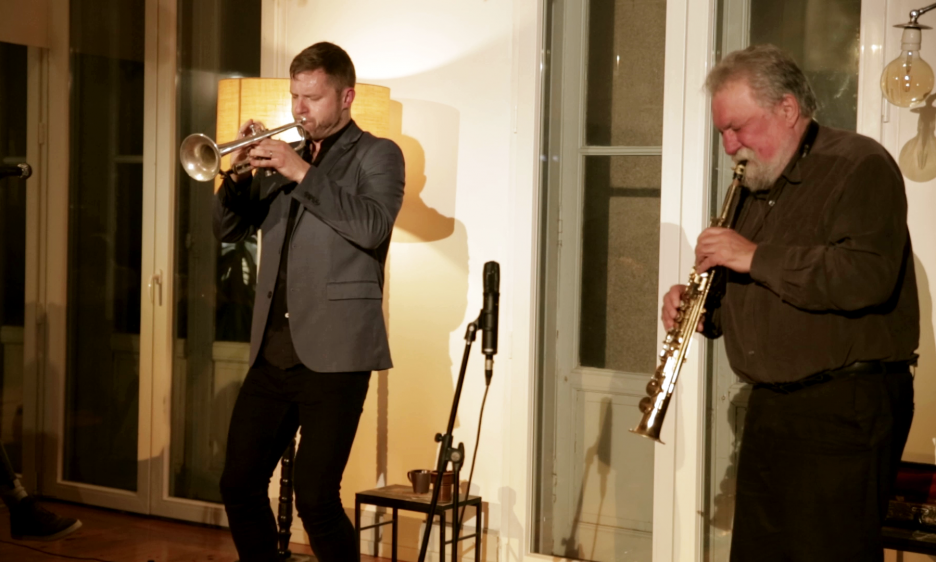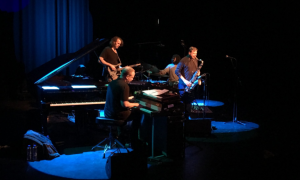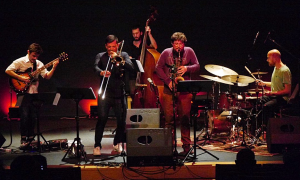Home » Jazz Articles » Ethnographies of Jazz » Provenance, Mal de mer, Duration: Evan Parker and Peter ...
Provenance, Mal de mer, Duration: Evan Parker and Peter Evans at Solilóquios in Porto

Reeds his horn, the Monoceros recognizes myth but only in an express fashion. This is principally what connects free improvisation with the Norte.
—Arian Bagheri Pour Fallah
Provenance
Evan Parker needs little introduction. To the listener and to the critic, clearly, but above all to the formation of musical matter. The rudiments of his making are well obscured twenty seconds in after he enkindles the first note. He plays the saxophone durably—static, in deathlike stillness. It is easy, in fact, to mistake his enterprise with that of the snake charmer. After all, he speaks of "the great masters" when questioned about the more rigorous, disciplined composers of the Orient. But the venomoid Parker incarnates before his hearers is hardly distinguishable from himself. Together they conspire to rid the concurrence of beginnings first and ends in due time. Ends, solid and synecdochic, of the entire gamut of human economy. For then, the dimly lit yoga studio at which the event takes place sinks into neither darkness nor its antipode, but the congeries of color and being—no stage lightning necessary. An audible digression from the end of the dwelling, across metaphor and plain speech of design, telos is at risk, by force of circumstance.Approaching Parker, he insists on standing up. After an unbroken solo set and three duos, he retains enough verve to propose so. He tells me he has to be close to my ears, citing my height, yet continues like that for the rest of the evening. Is that a wager? The last of the Three Blokes certainly is performing more frequently than ever. To the newer Norte audience, however, he may narrowly be compared to Brötzmann. Sharing little in common with his former comrade and bandleader, Parker's is no travail. You can tell this by the occasional malfunctioning attendance who attempts in vain to coordinate the blues amongst dialectics. Parker plays in continuum though rarely out of angst. There is an uncommon restraint to his enterprise, which might escape the initial look, and which is most actively present in his solo set. Canonically put, this stands apart from military, asunder spiritualism—from Ayler. Parker's embrace of chaos is strictly Lockean. It follows what Whitehead refers to as "the right chaos," a prerequisite of effective harmony. Reeds his horn, the Monoceros recognizes myth but only in an express fashion. This is principally what connects free improvisation with the Norte. The middle-aged woman with whom I converse before the performance cannot stop contemplating the view in which Portugal is, unlike France and other European countries currently weathering unrest, favoring the essential and the elementary, eschewing excess, as it were, her empirical assertion rooted in the political, and the mouvement des gilets jaunes in specific. In this context it is the basis of the myth that sustains Parker, never his exegesis.
Mal de mer
What follows Parker's spiral of beginnings is an estranged now—outcast and single. Peter Evans grounds his solo improvisation in the vacancy of the unfolding cosmos. He abducts and intercepts one passer-by. The narrative to be found in this succession is not that of an equalizing tempo, timbre or velocity. It is of swoon and of a foreign repose. Evans is tender but only as a dying, deaf tramp. The more he continues to negotiate breakable steps, the smaller his assembly. Parker's unfolding cosmos is nowhere to be found. In its absence, the trumpet is, as a tramp is, belittled excitedly. Low notes, close to the ground, closer, dust. Evans's eventual switch to the piccolo trumpet is far from a metaphor, as springs from the nearly-strangled wayfarer's distortion a song, shortly before he shivers back into oblivion. Wordlessness than soliloquy. The universe is denied the tramp:trumpet.If one were to read this metaphorically, the American Evans, who has recently moved to Portugal, would be the cultural émigré. And nothing could be farther from truth. Evans, remarking how "fancier" Porto is compared to his current whereabouts, Lisbon, is neither Henry Miller nor Paul Bowles. His engagements in the Portuguese scene from past, the 2014 The Freedom Principle, par exemple—included in my best-of list for the year—are very much indicative of the fact that mobility for him has long been a recurring extract of an ongoing activity, and integration into the Portuguese scene further removed from the need for material relocation. His move to Portugal is therefore neither an escape nor an attempt to get lost, to integrate and redefine. It is, like Parker's assimilation of the myth, an express and nonsacred volition, hence the reason why the Norte, which evidently lacks many of the transatlantic links the Lisboa region benefits from, appears to him as extravagant, in resonant opposition to the way it is mentally constructed for the average Norte people.
Duration
After prolonged applause of the attendance, the two pair to conclude the night, murmuring in the background, "Where do we go? Let's play." There is little room for mobility at the modest venue, as is for Wagnerisms, the improvisation's perpetuity distending it undividedly. The music's function is exclusively spatial in this regard. As if the seasick tramp of Evans were to confront Parker's sea, their meeting assigns to each further roles, as they assume likeness of one an other. Forget Elliott Carter and his ode to process. This event may be the closest one gets to Whitehead, to Bergson, and the latter's notion of duration, which here is affirmed only in the hindmost. Teleologically contravened, the rearranged space of the studio is attended and consumed, not ad hoc, but out of inapposite, sonic keepsakes.On the way to the venue, I walk Porto eastwards—a city to be saturated with blackwater of cosmos, wherein celestial orbs are neither empty nor full and the Tupi's Land without Evil finds its retrocausal urban analogue, even if transiently. Impure mobility.
Tags
PREVIOUS / NEXT
Support All About Jazz
 All About Jazz has been a pillar of jazz since 1995, championing it as an art form and, more importantly, supporting the musicians who make it. Our enduring commitment has made "AAJ" one of the most culturally important websites of its kind, read by hundreds of thousands of fans, musicians and industry figures every month.
All About Jazz has been a pillar of jazz since 1995, championing it as an art form and, more importantly, supporting the musicians who make it. Our enduring commitment has made "AAJ" one of the most culturally important websites of its kind, read by hundreds of thousands of fans, musicians and industry figures every month.
























